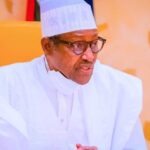….says FG need N7 trillion to fund 854 road projects
By Gift Chapi Odekina
The Minister of Works and Housing, Babatunde Raji Fashola has disclosed that the Lagos/Ibadan express way and the Second Niger Bridge will be completed in 2022.
The Minister also explained why 21 roads across the six geopolitical zones were selected for completion by the NNPC under the Credit Tax scheme.
According to him, monies that funds already budgeted for such roads in the budget will be retained in the various zones and used to complete other roads.
Fashola sho spoke when he appeared before the House of Representatives Committee on Works chaired by Rep. Abubakar Kabir to defend the 2022 budget of his Ministry however said that the Ministry was currently indebted to contractors to the tune of N420.58 billion for work already done.
He also said that the government would require about N7.430 trillion to fund about 854 ongoing highway contracts spread across the six geopolitical zones.
Responding to questions from the Lawmakers, the Minister said “the Lagos/Ibadan express road is scheduled for completion in 2022. At the moment, we have done cumulatively about 90 kilometers in sections one and two.
“For the second Niger Bridge, the plan is to complete it in 2022 and it is on schedule. The contractors tell us that the bridges will be fully connected by the end of quarter one in 2022. So, by the end of the first quarter, you can walk on it from the begining to the end. We lost some time during the COVID, but they are working to gain the time lost.”
Speaking on the on tax credit, he said “this scheme was initiated by the previous administration. So, it is an inherited policy, but it was not implemented. It was in 2016/2017 when we were looking for how to fund the budget that I came across it and the first project was the Obajana/Kabba road.
“The policy we inherited had a sunset date and so was going to lapse and we thought this was a useful way of finding money to fund some projects and so, we recommended to Me. President and he approved that we should continue with it. We then set up a team and certain governance rules were put up.
“Right now, there is a committee that seat in governance over the scheme headed by the Minister of Finance, Budget and National Planning. Nothing moves unless it passes through that committee.
“At the time the Executive Order was signed, a list of roads were recommended to the President because there were complain that only two roads were benefiting. So, a set of roads were presented to the President and he approved those roads to create a balance across the zones.
“There has been subsequent requests which extend beyond the approval of the President and these speaks to how the roads are picked. Usually, it is the taxable entity who apply to say I want to do this road because tax credit is asking the entity to spend his money in advance. They pay the tax in advance. It is not the usual process where we wait for them to declare profit, what tax credit means is that you are advancing tax to government.
“The order as inherited and as sustained allows the person to say I want to do this road. The condition is that it must be an infrastructure asset to which the public has the benefit is using. What you often find is that all the roads the roads that are chosen by those who want to use the credit have a business benefit for them and that is eminently sensible.
“It either leads to their factories or evacuate things for them. Really, that is not their responsibility because it is government that should provide those facilities so that they can do business. Anybody who wants to provide infrastructure that the public can use is eligible to use tax credit.
“Beyond NNPC, there are other interested companies like UniLiver, MTN, GLO, Flower Mills who are already showing interest and it is building momentum. We just recieved request for three roads from one of the major power generation companies affecting their business, saying they want to take on these roads. It is providing some solutions.
“Essentially, we are taking our tax in advance. So, it is still government that is building those roads by extension because when those tax comes through, it is harmotised for the person that has built the road.”
Speaking further on the 21 roads recently approved by the Federal Executive Council for construction by the NNPC, the Minister said “these 21 roads by NNPC already exit and have existing contracts. They are the roads you ask me about every year which we have not been able to fund. They are roads that also affects our energy security.
“NNPC is saying they are affecting their ability to distribute petroleum products. The reason why you see the concentration in Niger state is because Niger state has the second largest storage facility for petroleum products in the country. This year, the state was locked down for a week because the trucks that are over loaded and have damaged the roads over the years now hot stuck.
“Over the last three years, we have been trying to find a way of solving this problem and NNPC now came up with this solution. Payment for these contracts will be paid by NNPC subject to condition. We just got approval and has now set up a governance structure because NNPC will not give us money because we say so. We have told the contractors that under this scheme, nobody is bringing variation or augmentation. If you can’t do it, own up and get out of the scheme.
“So, there is alot of work still going on. What you have right now is just policy. But we are.teying to speed up so that we can gain alot during the dry weather. Irrespective of where the roads are, we have solution to 21 roads in our country.
“What we have done is that if a project move from one funding source to another, the amount saved from that project will be retained in that zone. We are compiling our records and when we finish, we are making our recommendation as to which roads in that zone the money can be applied to. If we save one naira in a zone, there are roads in that zone that the money will be used for.
“We have the option of either putting the money saved in the zone into completing one major road project, or share the money into several other road projects in the zone that will not be completed. But we are compiling our records and will come back to you. This policy was just approved last week”
Fashola disclosed that the Ministry is currently undertaking a total of 854 road projects across the country at a total cost of N7.43 trillion, adding that these roads contracts has been catigorised according to special funding mechanism.
These include the Highway Projects Financed and Presidential Infrastructure Development Fund, Highway Projects Financed with Soverign Sukuk fund, Highway Projects Financed under Raid infrastructure Development and Refurbished Investment Tax Credit Scheme and the Highway Projects funded from Multilateral loans.
He disclosed that an envelope of N282.6 billion was given to the Ministry in the 2022 budget estimate to fund highway projects necessitating the prioritisation or projects for completion across the six geopolitical zones.
While lamenting the low budgetary allocation to the Ministry, he said that apart from the pressure of resources to pay contractors for jobs already completed, there was the problem of inadequate allocation , where N100 million or N200 million is allocated for roads costing several billions of naira.
He said further that as at October 20, 2021, the Ministry was indebted to contractors to the tune of N420.58 billion for work already completed.
The Minister however said there was the need to concentrate on completing existing road contracts across the country rather than embarking on new ones saying “enough of new roads and new projects. Let us concentrate our limited resources to complete or progress what we have started”.
Chairman of the Committee, Rep. Kabiru Bichi said it was commendable that even in the face of existing financial constraints, the Federal Government is currently implementing over 800 contracts for roads’ reconstruction and rehabilitation, and building new bridges across the country.
Bichi said however said to overcome the problems of grossly insufficient budgetary provisions, there is the need to be creative in sourcing funds.
Ends



